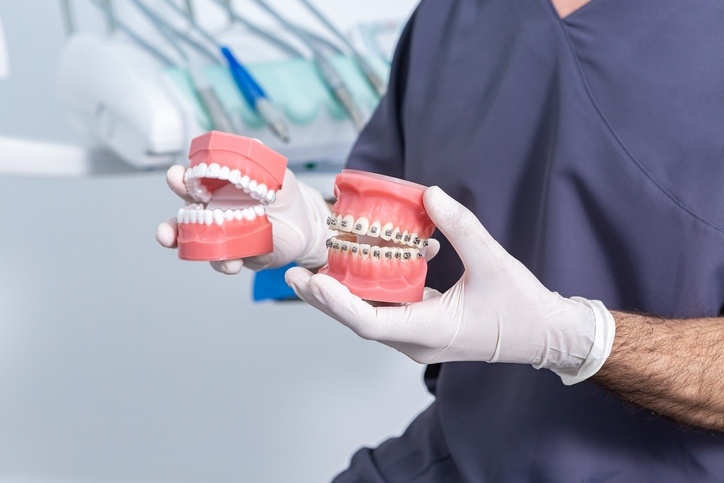What is the Difference Between Dental Implants and Dentures?
Having missing teeth is no walk in the park. Not only does a gapped smile affect your confidence, but it can also impede your ability to eat and speak with ease. In some cases, missing teeth can even change the structure of your face over time. Thankfully, modern dentistry offers several excellent solutions for missing teeth, and most patients can find one that works for their needs. Dental implants and dentures are two of the most common approaches, but how do you know which one is best? Let’s take a deep dive into dental implants vs. dentures and which option makes the most sense for you.

What Are Dental Implants?
Dental implants are the most permanent solution for missing teeth, although the procedure is much more involved than other dental treatments. Your dental surgeon will start by surgically placing a titanium post into the jawbone and then waiting for it to heal. After the healing period, a crown will be affixed to the top. The end result is a natural-looking tooth that feels and functions just like a real one.
What Are Dentures?
Dentures are what most people picture when they think about replacing a row of missing teeth. These removable appliances are custom-made to fit in your mouth comfortably. Some patients need complete dentures—used when all of the teeth in an arch are missing—while others only require a partial set. In any case, today’s dentures are much more comfortable and convenient than they used to be.
The Difference Between Dental Implants and Dentures
While dental implants and dentures serve the same purpose, they’re vastly different approaches to treatment. As you decide between these two options and consider their differences, be sure to take these factors into account:
Functionality and Comfort
Once the jawbone has fully healed, dental implants will look and function just like natural teeth. You can eat your favorite foods and participate in long conversations without worry about slipping or movement. They feel natural and comfortable, most people forget they even have them!
Dentures are much more comfortable than they used to be, but they can still sometimes shift while eating or speaking. Some patients experience minor gum irritation at the beginning of treatment, too. However, as you get used to your dentures, these issues become easier to manage.
Appearance
Both tooth replacement options provide a bright, natural-looking smile. The crowns used on dental implants are designed to match your existing teeth perfectly, and dentures are also crafted to look like natural teeth and gums.
Durability and Lifespan
Dental implants are meant to be a permanent solution to missing teeth. With the proper care and regular check-ins with your dentist, the average dental implant can last a lifetime. The crown may need to be replaced every 15 years or so, but you shouldn’t need additional surgery!
Dentures, on the other hand, need to be relined or remade every five to 10 years. The shape of your jaw may change over time, so your dentures will need adjustments to keep them from becoming loose and uncomfortable.
Maintenance
Dental implants are a dream for patients who don’t want to be stuck doing extra maintenance. Just keep up with daily brushing and flossing, and you should be good to go! However, dentures require much more specific maintenance. They should be removed and cleaned daily to prevent plaque buildup and staining. They also need to be soaked overnight to keep them from drying out or losing their shape.
Which Is Better, Dental Implants or Dentures?
Now that you know a little more about the pros and cons of dental implants vs. dentures, you can start thinking about which option is best for you. No single treatment will work for everyone, so you and your dentist will need to consider all aspects of your health needs, lifestyle preferences, and budget. While you won’t know the best choice until you talk to your dentist, these guidelines can help clarify your situation:
When to Choose Dental Implants
Dental implants might be a good choice for you if:
- You are looking for a permanent, long-term solution.
- You have good overall oral and general health.
- You have sufficient jawbone density to support the implant.
- You want a low-maintenance option that feels and functions like natural teeth.
When to Choose Dentures
If dental implants won’t work for your circumstances, dentures are still an excellent option. Consider dentures if:
- You are missing multiple or all of your teeth in an arch.
- You are looking for a more affordable, non-surgical option.
- Your jawbone is not strong enough to support implants, and you are not a candidate for bone grafting.
- You are comfortable with the idea of a removable appliance and its required maintenance.
Say Hello to Your Ideal Smile
You don’t have to learn to live with missing teeth! Modern tooth replacement options deliver excellent results to patients of all ages. At Elite Dental of Highland, we’re here to provide the guidance you need as you choose from these options. Have questions about veneers vs. dentures for aging teeth? Perhaps you’re considering dental implants for the first time. In any case, contact our Highland, IN team to learn more.
FAQs About Dental Implants vs. Dentures
Does getting dental implants hurt?
The dental implant procedure is performed under local anesthesia, so you shouldn’t feel any pain. After surgery, you might feel some discomfort and swelling, but these symptoms can be managed with over-the-counter pain medication.
How long does it take to get used to dentures?
If your dentures don’t feel natural right away, don’t worry! It can take a few weeks to fully adjust to wearing them.
Are implant-supported dentures an option?
Yes! Many patients are candidates for implant-supported dentures. This treatment involves placing a few implants in the jawbone as an anchor to a full denture.
